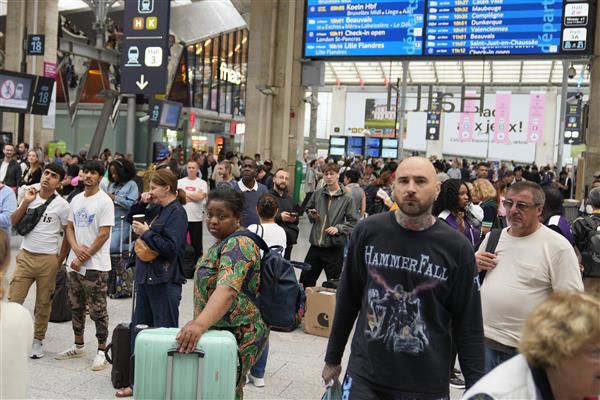Saboteurs paralyse French high-speed rail network hours before start of Olympics
Paris, July 26
France’s high-speed rail network was hit with widespread and “criminal” acts of vandalism including arson attacks, paralysing travel to Paris from across the rest of France and Europe only hours before the grand opening ceremony of the Olympics.
French officials described the attacks as “criminal actions” and said they were investigating whether they were linked to the Olympic Games. The disruptions as the world’s eye was turning to Paris were expected to affect a quarter of a million people alone on Friday and endure through the weekend, and possibly longer, officials said.
Transport Minister Patrice Vergriete described people fleeing from the scene of fires and the discovery of incendiary devices at the site.
“Everything indicates that these are criminal fires,” he said.
The incidents paralysed several high-speed lines linking Paris to the rest of France and to neighbouring countries, Vergriete said, speaking on BFM television.
The attack occurred against a backdrop of global tensions and heightened security measures as the city prepared for the 2024 Olympic Games. Many travellers were planning to converge on the capital for the opening ceremony, and many vacationers were also in transit.
As Paris authorities geared up for a spectacular parade on and along the Seine river amid tightened security, three fires were reported near the tracks on the high-speed lines of Atlantique, Nord and Est. The disruptions particularly affected Paris’ major Montparnasse station. Videos posted on social networks showed the hall of the station saturated with travellers.
The Paris police prefecture “concentrated its personnel in Parisian train stations” after the “massive attack” that paralysed the TGV high-speed network, Laurent Nuñez, the Paris police chief told France Info television.
Many passengers at the Gare du Nord, one of Europe’s busiest train stations, were looking for answers and solutions on Friday morning. All eyes were on the central message boards as most services to northern France, Belgium and the United Kingdom were delayed.
“It’s a hell of a way to start the Olympics,” said Sarah Moseley, 42, as she learned that her train to London was an hour late.
“They should have more information for tourists, especially if it’s a malicious attack,” said Corey Grainger, a 37-year-old Australian sales manager on his way to London, as he rested on his two suitcases in the middle of the station.
Travel to and from London beneath the English Channel, to neighbouring Belgium, and across the west, north, and east of France was affected by what the French national rail company SNCF called a series of coordinated overnight incidents.
Government officials denounced the acts, though they said there was no immediate sign of a direct link to the Olympics. National police said authorities were investigating the incidents. French media reported a major fire on a busy western route.
Sports Minister Amélie Oudéa-Castera said authorities were working to “evaluate the impact on travellers, athletes and ensure the transport of all delegations to the competition sites” for the Olympics. Speaking on BFM television, she added, “Playing against the Games is playing against France, against your own camp, against your country.” She did not identify who was behind the vandalism.
Passengers at St Pancras station in London were warned to expect delays of around an hour to their Eurostar journeys. Announcements in the departure hall at the international terminus informed travellers heading to Paris that there was a problem with overhead power supplies.
SNCF said it did not know when traffic would resume and feared that disruptions would continue “at least all weekend”. SNCF teams “were already on site to carry out diagnostics and begin repairs,” but the “situation should last at least all weekend while the repairs are carried out,” the operator said. SNCF advised “all passengers to postpone their journey and not to go to the station”, specifying in its press release that all tickets were exchangeable and refundable.
Valerie Pecresse, president of the regional council of the greater Paris region, said “As many as 250,000 travellers will be affected today on all these lines.” Substitution plans were under way, but Pecresse advised travellers “not to go to stations”.
The trouble comes ahead of an opening ceremony has been planned for later Friday in which 7,000 Olympic athletes are due to sail down the Seine past iconic Parisian monuments such as Notre-Dame Cathedral, the Louvre Museum, and the Musee d’Orsay.









